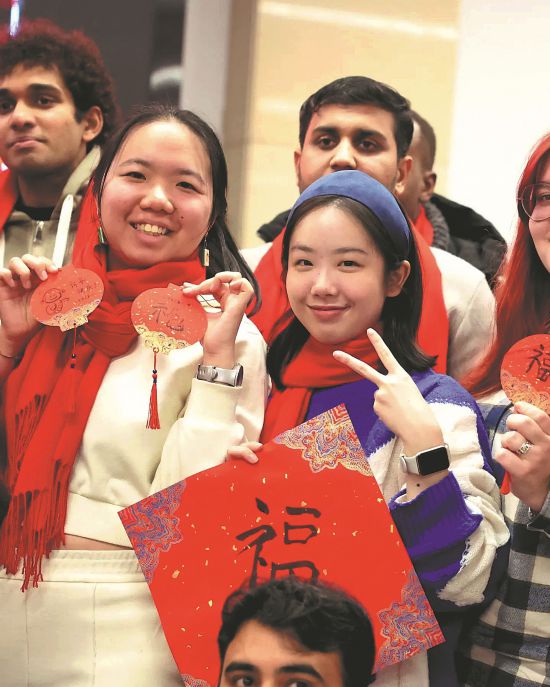
Cheok Xuan Yu, a Malaysian student who is studying at Tianjin University, poses with a paper square bearing the Chinese character fu, which means good fortune, during a cultural exchange event at the university. [Photo provided to China Daily]
For Malaysian student Cheok Xuan Yu, life in China is filled with cultural encounters.
Just a week before this year's Spring Festival, she and a group of international students from Tianjin University traveled to Yangliuqing, an ancient town on the outskirts of Tianjin, to experience the traditional craft of woodblock New Year prints.
"The five-step process — drawing, carving, printing, painting and mounting — showed me how intricate the pictures are and how culture can drive an entire industry," Cheok recalled.
It was the second time Cheok spent the Spring Festival holiday in China. "It feels just like home," she said. "We also have reunion dinners and festive red envelopes in Malaysia, and there are many similarities between Chinese and Malaysian cultures."
The 22-year-old, who is now studying at Tianjin University's School of Life Sciences, was among the 87 Malaysian students at the university who jointly wrote a letter to President Xi Jinping in March last year to express their feelings about China's development and the Chinese people's friendliness.
In the letter, the students said they were determined to act as messengers and promoters of Chinese-Malaysian friendship and aspired to use their knowledge to help build a China-Malaysia community with a shared future.
To their surprise, the letter was mentioned by Xi in his congratulatory message exchanged with Malaysian King Sultan Ibrahim Sultan Iskandar in May on the 50th anniversary of the establishment of bilateral diplomatic relations.
In the message, Xi said he was pleased to see that the cause of friendship between the two countries has inheritors.
By 2023, Tianjin University had a total of nearly 600 Malaysian students, and more than 100 Malaysian students are enrolled annually, making it one of the Chinese universities with the largest enrollment of Malaysian students.
Cheok said that the friendly relationship and close educational exchanges between the two countries have provided opportunities for students like her to study in China to pursue better self-development, which will then allow her to help promote bilateral exchanges.
During her stay in China, Cheok has had rich experiences not only in cultural exploration but also in academic innovation.
Last year, she joined an entrepreneurial project to promote functional pet food additives — focusing on improving pet immunity and health — in the Southeast Asian market, including in Malaysia.
"Malaysia has a tropical climate and a limited selection of functional pet foods," she said. "We hope to leverage China's mature industrial chain and resources to bring our products to this 'blue ocean' market."
The project, representing Tianjin University, won a silver prize at a national entrepreneurship competition.
Social media is another window into China for Cheok, whose great-grandfather lived there before migrating to Malaysia.
"I learned about Chinese universities and tech trends through Douyin before I came here," she said, adding that she found that more Malaysians are now active on Chinese platforms like Xiaohongshu, or RedNote.
With the mutual visa-exemption policy, Cheok said she foresees even more frequent exchanges — her family is already planning to attend her graduation in Tianjin this year, while more of her Chinese friends are preparing trips to Malaysia.
According to Chinese Ambassador to Malaysia Ouyang Yujing, nearly 3.8 million Chinese tourists visited Malaysia last year, and there were over 500 flights between the two countries every week.
Cheok said international students like her could act as cultural ambassadors. "We bring stories from China back to Malaysia, and we share our home culture with Chinese friends."
Teo Jin Yu, another Malaysian student at Tianjin University, said, "Platforms like RedNote and TikTok are very popular among young people in Malaysia, and they use these to learn about Chinese culture, food and lifestyles in preparation for future travel."
While such platforms have strengthened Malaysians' understanding of China, Teo said he also tries to introduce Malaysia to more Chinese people.
Last year, he participated in the university's international culture festival and displayed traditional Malaysian foods and crafts, such as batik painting, at the Malaysian booth.
"Visitors were very interested and supportive, and even when things moved slowly due to the crowd, they waited patiently. This made me feel the warmth and friendliness of China," he recalled.
Despite the differences between the two countries, Teo said he is impressed by the efficiency of life in China and is attracted to the university's specialization in information management.
"The teaching here emphasizes specialization, and every knowledge point is deeply explored, which has solidified my foundation in my field," he said.
Viewing himself as a beneficiary of educational exchanges, Teo said scholarship programs have provided invaluable opportunities for young Malaysians to study abroad.
He said he hopes to return to Malaysia in the future to use the skills he has acquired in China, as well as the efficient work ethic and cultural insights he has gained.
As more students like him travel between the two countries, cooperation in education, technology and culture will only grow stronger, Teo said.
Yang Cheng in Tianjin contributed to this story.
 Editor:Qiu Xiaochen
Editor:Qiu Xiaochen